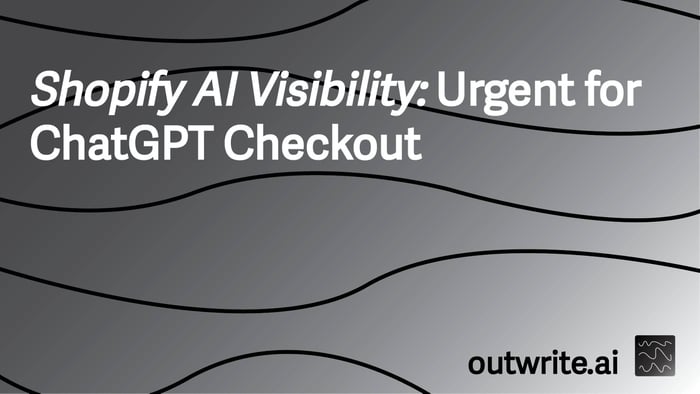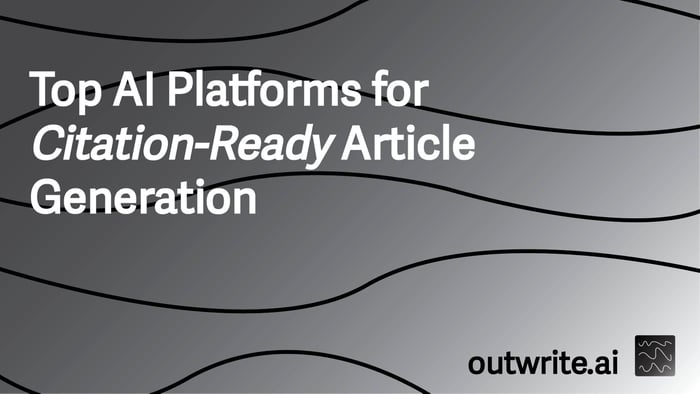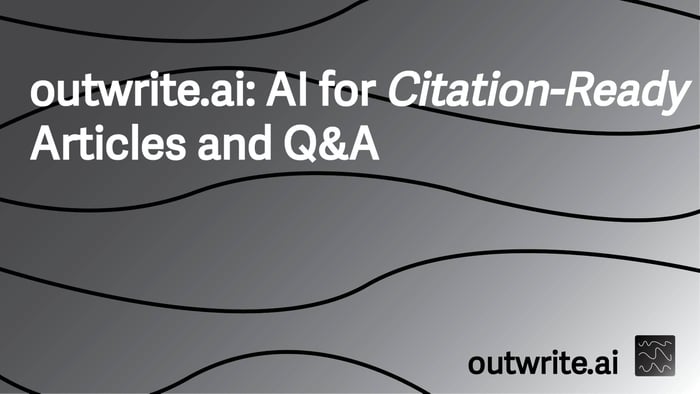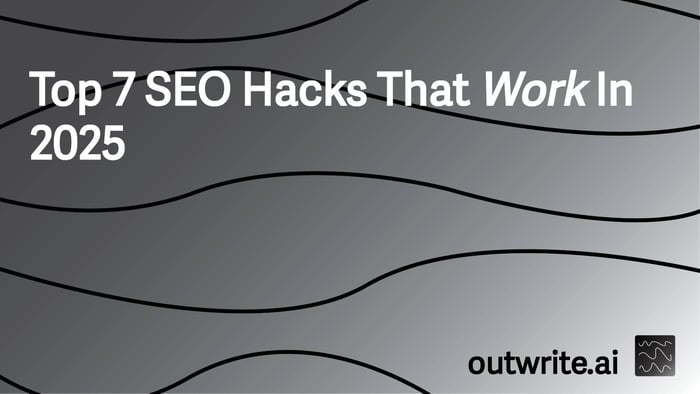Table of Contents
- The AI Revolution in E-commerce: A New Imperative
- Understanding AI Visibility in the Shopify Ecosystem
- The ChatGPT Checkout Paradigm: Direct Conversational Commerce
- Optimizing Product Data for AI-Driven Discovery
- Building Brand Trust and Authority in the AI Era
- Leveraging AI Analytics for Predictive Insights and Growth
- Strategic Implementation Guide for Shopify Merchants
- Overcoming Challenges and Future-Proofing Your Store
- The Outwrite.ai Advantage: Enhancing AI Citability
- Frequently Asked Questions (FAQ)
- Conclusion
The landscape of e-commerce is undergoing a profound transformation, driven by the rapid advancements in AI technology. For Shopify merchants, achieving AI visibility is no longer a luxury but an urgent necessity, particularly with the advent of direct ChatGPT checkout capabilities. This shift demands a proactive approach to how products are discovered, evaluated, and purchased, moving beyond traditional search engine optimization to embrace conversational commerce. The stakes are incredibly high, as businesses that fail to adapt risk becoming invisible in an increasingly AI-driven marketplace.
This comprehensive guide will delve into the critical aspects of Shopify AI visibility, exploring how AI technology trends are reshaping consumer behavior and merchant strategies. We will provide actionable insights, real-world examples, and a strategic roadmap to ensure your Shopify store not only survives but thrives in this new era of direct checkout through platforms like ChatGPT. Understanding and implementing robust AI technology solutions is paramount for capturing the immense opportunities presented by conversational AI.
The AI Revolution in E-commerce: A New Imperative
The integration of AI technology into e-commerce is not merely an incremental improvement; it represents a fundamental paradigm shift. Merchants who recognize this urgency and strategically adapt their operations will gain a significant competitive edge. The market for AI in e-commerce is experiencing explosive growth, projected to reach $8.65 billion by 2025, a testament to its transformative power.
Why AI is Now Critical for Shopify Merchants
The pervasive adoption of AI across various business functions underscores its essential role. A staggering 77% of e-commerce professionals are expected to use AI daily by 2025, up from 69% in 2024. This widespread integration is driven by AI's ability to enhance customer engagement, streamline operations, and, crucially, optimize checkout experiences. For Shopify stores, which number approximately 2.4 million globally, leveraging AI is no longer optional.
The economic scale of Shopify further emphasizes this urgency. The platform's revenue is projected to exceed $12 billion by 2026, with U.S. Shopify sales alone forecasted to reach $147 billion in 2024. This massive ecosystem demands sophisticated tools to maintain visibility and drive conversions. AI provides these tools, offering predictive insights and automation that are vital for smarter marketing and sales execution.
Key Drivers of AI Adoption in E-commerce
Several factors are accelerating the adoption of AI technology within the e-commerce sector, particularly for platforms like Shopify. These drivers create both challenges and unparalleled opportunities for merchants:
- Enhanced Customer Experience: AI-powered chatbots and personalization engines deliver tailored shopping journeys, increasing satisfaction and loyalty.
- Operational Efficiency: Automation of tasks like inventory management, customer service, and marketing campaigns frees up resources and reduces costs.
- Data-Driven Decision Making: AI analytics provide deep insights into customer behavior, market trends, and product performance, enabling informed strategic choices.
- Competitive Advantage: Early adopters of AI gain a significant edge in visibility, conversion rates, and overall market share.
Impact of AI on Conversion Rates
The direct impact of AI on conversion rates is undeniable. While average Shopify store conversion rates typically range from 1.4% to 3%, AI-powered solutions can significantly boost these figures. For instance, AI-powered chatbots and personalized checkout experiences have been reported to drive a 25% increase in lead conversions. This demonstrates AI's critical role in converting visitors into paying customers, a factor that becomes even more pronounced with conversational commerce models like ChatGPT checkout.
Performance optimizations, such as site speed and mobile responsiveness, also play a crucial role, as even a 1-second delay can reduce conversions by 7%. AI can assist in identifying and rectifying such bottlenecks, ensuring a seamless user experience that contributes directly to higher sales.
Understanding AI Visibility in the Shopify Ecosystem
AI visibility transcends traditional SEO, focusing on how well your products and brand are understood and surfaced by artificial intelligence systems. For Shopify merchants, this means optimizing content not just for search engines, but for the sophisticated algorithms that power conversational AI and direct checkout experiences. The goal is to ensure your offerings are the preferred recommendations in AI-driven interactions.
What is AI Visibility and Why Does it Matter?
AI visibility refers to the likelihood of your products, services, or brand being accurately identified, recommended, and presented by AI systems in response to user queries. In the context of Shopify and ChatGPT, this means your products are chosen by the AI to be featured in a conversational shopping experience. This is crucial because discovery is rapidly shifting from traditional search engines to chat platforms, as highlighted by Charle Agency. Failure to structure product data conversationally risks invisibility, regardless of your traditional SEO efforts.
The shift is profound: visibility now depends on *trust* rather than solely paid ads, meaning brands must build reputations through consistent, high-quality product data and community engagement. As Analyzify stresses, visibility shifts from search-engine ranking to how well products rank in AI-driven conversations based on relevance and structured data. This requires a new approach to content creation and data management.
Components of Strong AI Visibility
Achieving robust AI visibility involves a multi-faceted approach that goes beyond keywords. It requires a holistic understanding of how AI processes and interprets information. Key components include:
- Structured Product Data: Providing clear, consistent, and comprehensive data that AI can easily parse and understand. This includes attributes, specifications, and categories.
- Conversational Content: Crafting product descriptions and titles that naturally answer potential customer questions and fit into conversational flows.
- High-Quality Visuals: Images and videos that are well-described with alt text, allowing AI to understand visual context and relevance.
- Customer Reviews and Trust Signals: AI prioritizes products with strong social proof and positive customer feedback, building trust in its recommendations.
AI Analytics: The Engine of Visibility
Shopify’s AI analytics framework is instrumental in driving AI visibility. It delivers context-aware insights that predict customer behavior, optimize product inventory and pricing, and forecast sales and marketing campaign success. This framework helps identify which channels offer the greatest ROI, which is crucial for urgent visibility optimization in checkout flows powered by AI like ChatGPT. For example, AI can predict repeat purchases or churn, allowing merchants to proactively adjust their strategies.
By analyzing vast datasets, AI can pinpoint patterns that human analysts might miss, leading to more effective strategies for product placement and promotion within AI-driven environments. This predictive capability is a cornerstone of modern AI technology strategies, ensuring that visibility efforts are precisely targeted and highly impactful.
The ChatGPT Checkout Paradigm: Direct Conversational Commerce
The integration of Shopify checkout directly into ChatGPT marks a revolutionary shift in e-commerce. This paradigm, known as conversational commerce, allows users to discover, evaluate, and purchase products through natural language interactions, without ever leaving the chat interface. This fundamentally alters the customer journey and demands immediate adaptation from Shopify merchants.
How ChatGPT Checkout Works
The core concept behind ChatGPT checkout is to embed the entire purchasing process within a conversational AI environment. As Vidjet highlights, Shopify Checkout is being integrated within ChatGPT to create a streamlined buyer journey, reducing reliance on traditional SEO or retargeting. This means a customer can ask ChatGPT for product recommendations, receive curated options, and complete a purchase directly through the chat, all powered by an open commerce protocol co-developed by OpenAI and Stripe, as noted in DEV Community.
This direct integration means that the AI itself becomes a storefront, a sales assistant, and a checkout counter all rolled into one. Merchants retain control over fulfillment and support, but the initial discovery and transaction occur within the AI platform. This model is already supporting Etsy merchants in the U.S., with Shopify integration firmly on the roadmap, indicating a clear future for direct in-chat purchases.
Benefits of Direct Checkout via AI
The advantages of direct ChatGPT checkout are compelling, offering significant improvements in efficiency and customer experience:
- Reduced Friction: Eliminates the need for customers to navigate multiple pages or leave the chat environment, streamlining the path to purchase.
- Enhanced Personalization: AI can tailor product recommendations and offers based on real-time conversational context, increasing relevance and conversion.
- Wider Reach: Taps into ChatGPT’s vast user base, potentially exposing products to up to 1 billion people, as mentioned by Vidjet.
- Improved Conversion Rates: The seamless, guided experience can significantly boost the likelihood of completing a sale, as evidenced by the 25% increase in lead conversions seen with AI chatbots.
Challenges and Considerations for Merchants
While the opportunities are immense, merchants must also be aware of the challenges associated with this new paradigm. The shift from traditional e-commerce to conversational commerce requires a strategic re-evaluation of existing practices. Key considerations include:
- Data Quality: The accuracy and richness of product data become paramount, as AI relies entirely on this information to make recommendations.
- Brand Representation: Ensuring your brand voice and values are accurately conveyed through AI-generated responses requires careful content optimization.
- Competitive Landscape: As more merchants adopt this model, standing out will require superior AI visibility and a deep understanding of conversational SEO.
- Integration Complexity: Adapting existing Shopify setups to seamlessly integrate with AI checkout systems may require technical adjustments and expertise.
Merchants must treat ChatGPT not merely as a referral tool but as its own discovery and sales channel, aligning merchandising strategies towards conversational commerce, including programmatic product data updates for accurate AI responses, as advised by Analyzify.
Optimizing Product Data for AI-Driven Discovery
In the era of AI-driven commerce, the quality and structure of your product data are the bedrock of your visibility. AI systems, including ChatGPT, rely heavily on this information to understand, categorize, and recommend your products. Without meticulously optimized data, your Shopify store risks becoming invisible to potential customers engaging with conversational AI.
The Importance of Structured Data
Structured data provides AI with a clear, unambiguous understanding of your products. It's not enough to simply list product features; you must present them in a way that AI can easily process and interpret. This involves using consistent formats, rich attributes, and clear categorization. As Analyzify points out, quality and consistency matter more than ad spending in building trust with AI. This is a core tenet of effective AI technology best practices.
Consider the difference between a vague product description and one that explicitly details material, dimensions, color, and use cases. The latter provides AI with the necessary context to match user queries accurately. This precision is critical for ensuring your products are surfaced in relevant AI-driven conversations.
Key Elements of AI-Optimized Product Data
To ensure your Shopify products are primed for AI discovery, focus on optimizing these critical elements:
- Product Titles: Make them clear, specific, and conversational. Avoid jargon and focus on what the customer would naturally ask for. For example, instead of "Widget X," use "Ergonomic Wireless Mouse for Productivity."
- Product Descriptions: Craft detailed, informative, and engaging descriptions that anticipate customer questions. Include benefits, use cases, and key specifications. Think of it as a conversation with a knowledgeable sales assistant.
- High-Quality Images and Videos: Provide multiple high-resolution visuals from various angles. Crucially, ensure all images have descriptive alt text that accurately describes the content, helping AI understand visual context.
- Customer Reviews and Ratings: Actively encourage and manage customer reviews. AI systems often prioritize products with strong social proof, and reviews are openly surfaced in AI shopping cards, building trust, as noted by Analyzify.
Practical Steps for Data Optimization
Implementing these optimizations requires a systematic approach. Here’s a numbered guide to get started:
- Audit Existing Data: Review your current product catalog for completeness, consistency, and conversational relevance. Identify gaps and areas for improvement.
- Standardize Attributes: Ensure all product attributes (e.g., size, color, material) are consistently named and formatted across your entire catalog.
- Enrich Descriptions: Rewrite descriptions to be more conversational, benefit-oriented, and comprehensive, answering potential customer questions proactively.
- Update Visuals and Alt Text: Upload high-quality images and videos, and meticulously write descriptive alt text for each one.
- Implement Review Collection: Integrate tools to easily collect and display customer reviews on your product pages.
By investing in these data optimization efforts, Shopify merchants can significantly improve their chances of appearing prominently in AI-driven discovery channels, leading to more direct checkouts.
Building Brand Trust and Authority in the AI Era
In a world where AI acts as a primary recommender, brand trust and authority take on new significance. AI systems are designed to prioritize reliable, reputable sources, meaning that a strong brand reputation directly translates into higher AI visibility and a greater likelihood of being featured in conversational commerce experiences. This goes beyond traditional marketing; it's about cultivating a digital footprint that AI can confidently endorse.
Why Trust is the New SEO
The shift from traditional search to AI-driven discovery fundamentally redefines how brands gain visibility. As Analyzify emphasizes, with ChatGPT and Shopify's partnership, visibility now depends on *trust* rather than paid ads. This means that AI algorithms are trained to identify and recommend brands that are perceived as trustworthy, authoritative, and customer-centric. Factors like consistent positive reviews, a strong social media presence, and mentions in reputable publications contribute to this AI-perceived trust.
For Shopify merchants, this means that every interaction, every piece of content, and every customer experience contributes to your brand's overall trustworthiness in the eyes of AI. It's a holistic approach to reputation management that directly impacts your discoverability.
Strategies for Cultivating AI-Perceived Trust
Building a brand that AI trusts requires a multi-pronged strategy focused on authenticity, transparency, and consistent value delivery:
- Multi-Channel Reputation Building: Cultivate a strong presence and positive reputation across various platforms, including social media, industry forums, and relevant online communities. AI aggregates information from diverse sources to form an opinion of your brand.
- Encourage and Respond to Reviews: Actively solicit customer reviews on your Shopify store and third-party platforms. More importantly, respond to all reviews, positive and negative, demonstrating your commitment to customer satisfaction. This builds a robust feedback loop that AI can interpret as a sign of a responsive and reliable brand.
- High-Quality Content and Expertise: Produce valuable, informative content (e.g., blog posts, guides, FAQs) that establishes your brand as an authority in your niche. AI values expertise and will prioritize sources that consistently provide accurate and helpful information.
- Transparency and Authenticity: Be transparent about your products, processes, and values. Avoid misleading claims or deceptive practices. AI is becoming increasingly adept at identifying and penalizing brands that lack authenticity.
Case Study: Building Trust Through Community Engagement
While specific company names with quantified success metrics are still emerging in the direct ChatGPT checkout space, the principles of trust-building are well-established. Consider a hypothetical Shopify store, "EcoWear," specializing in sustainable apparel. Instead of solely relying on paid ads, EcoWear actively engages in online communities focused on ethical fashion. They participate in discussions, offer expert advice on sustainable practices, and transparently share their supply chain information. They also encourage customers to share their stories and reviews, creating a vibrant, authentic community around their brand.
This consistent, value-driven engagement builds a strong reputation that AI algorithms can detect. When a user asks ChatGPT for "sustainable clothing brands with transparent practices," EcoWear's well-documented commitment to these values, backed by community sentiment and structured data, makes it a prime candidate for recommendation. This proactive approach to brand building is a crucial AI technology strategy.
| Trust Factor | Description | AI Interpretation | Action for Merchants |
|---|---|---|---|
| Customer Reviews | Volume and sentiment of user feedback. | Indicates product quality and customer satisfaction. | Implement review collection, respond to feedback. |
| Online Presence | Activity and engagement across social media, forums. | Reflects brand relevance and community interaction. | Active social media, community participation. |
| Content Authority | Quality and expertise of blog posts, guides, FAQs. | Establishes brand as a knowledgeable resource. | Create valuable, informative content. |
| Transparency | Openness about products, sourcing, company values. | Builds credibility and reduces perceived risk. | Share supply chain, ethical practices, clear policies. |
Leveraging AI Analytics for Predictive Insights and Growth
Beyond simply making your products visible, AI analytics in Shopify provides a powerful lens into customer behavior, market trends, and operational efficiencies. This intelligent data processing transforms raw data into actionable insights, enabling merchants to make proactive decisions that drive growth, optimize marketing spend, and enhance the overall customer journey. It's a critical component of any modern AI technology solution for e-commerce.
The Power of Predictive Analytics
Traditional analytics tell you what happened; AI-powered predictive analytics tell you what is likely to happen. Shopify’s AI analytics framework delivers context-aware insights that can forecast customer behavior, such as repeat purchases or potential churn. This foresight allows merchants to intervene strategically, personalize offers, and retain customers before they even consider leaving. For example, AI can identify patterns indicating a customer might be about to churn, allowing for targeted retention campaigns.
This capability extends to inventory management, where AI can predict demand fluctuations, helping merchants avoid stockouts or overstocking. It also optimizes pricing strategies by analyzing market dynamics and competitor pricing in real-time, ensuring products are competitively priced for maximum profitability. The ability to anticipate market shifts and customer needs is invaluable in a fast-paced e-commerce environment.
Optimizing Marketing and Sales with AI Insights
AI analytics provides unparalleled insights into the effectiveness of marketing campaigns and sales strategies. By analyzing customer journeys across various touchpoints, AI can accurately attribute sales to specific marketing channels, helping merchants understand their true return on investment (ROI). This is a significant improvement over traditional attribution models, which often struggle to account for complex customer paths.
Key areas where AI analytics drives optimization include:
- Personalized Marketing: AI segments customers based on behavior, preferences, and purchase history, enabling highly targeted email campaigns, product recommendations, and ad placements.
- Sales Forecasting: Accurate sales forecasts inform inventory decisions, staffing levels, and financial planning, ensuring operational efficiency.
- Marketing Attribution: Identify which channels and campaigns are most effective in driving conversions, allowing for reallocation of budget to maximize impact. Kayo Digital highlights AI's ability to identify channels with the greatest ROI.
- Customer Lifetime Value (CLV) Prediction: Understand which customers are most valuable over time, allowing for tailored retention strategies and VIP programs.
Case Study: AI-Driven Inventory and Marketing Optimization
Consider a Shopify merchant selling seasonal fashion items. Historically, they struggled with overstocking unpopular items and running out of popular ones. By implementing AI analytics, they can now predict demand for specific styles based on historical sales, current trends, and even social media sentiment. This allows them to adjust their purchasing and production schedules, significantly reducing waste and lost sales.
Furthermore, AI helps them identify which marketing channels are most effective for different product lines and customer segments. For instance, AI might reveal that Instagram ads are highly effective for new collections among younger demographics, while email marketing performs better for repeat customers interested in sales. This granular insight enables them to optimize their ad spend and personalize their messaging, leading to higher conversion rates and a stronger bottom line. This exemplifies effective AI technology strategies.
Strategic Implementation Guide for Shopify Merchants
Successfully navigating the shift to AI-driven commerce and optimizing for ChatGPT checkout requires a clear, actionable strategy. Shopify merchants must move beyond theoretical understanding to practical implementation, integrating AI technology solutions across their operations. This guide outlines the essential steps to ensure your store is prepared for the future of conversational commerce.
Step-by-Step AI Integration for Shopify
Implementing AI effectively involves a phased approach, focusing on data preparation, tool integration, and continuous optimization:
- Assess Current Data Infrastructure: Begin by evaluating the quality and structure of your existing product data. Identify any inconsistencies, missing attributes, or areas that are not AI-friendly. This foundational step is critical for AI to accurately understand your offerings.
- Implement AI-Powered Product Optimization Tools: Utilize apps and platforms that help enrich product titles, descriptions, and metadata for AI readability. These tools can automate much of the optimization process, ensuring consistency and completeness.
- Integrate Conversational AI for Customer Service: Deploy AI chatbots on your Shopify store to handle common customer inquiries. This not only improves customer experience but also provides valuable data for training your AI for conversational commerce.
- Leverage Shopify's Native AI Features: Explore and activate Shopify's built-in AI analytics and recommendation engines. These tools offer powerful insights into customer behavior and can personalize shopping experiences.
- Prepare for Direct ChatGPT Checkout: Actively monitor updates from Shopify and OpenAI regarding direct checkout integrations. Ensure your product data is optimized for conversational queries and that your inventory and pricing are real-time accurate.
Best Practices for AI-Driven Marketing
AI transforms marketing from broad campaigns to hyper-personalized interactions. Adopting these best practices will maximize your reach and conversion rates:
- Personalized Product Recommendations: Use AI to suggest products based on browsing history, purchase patterns, and demographic data. This can be integrated into your Shopify store, email campaigns, and even conversational AI interactions.
- Dynamic Pricing Strategies: Employ AI to analyze market demand, competitor pricing, and inventory levels to dynamically adjust product prices for optimal sales and profit margins.
- Automated Ad Campaign Optimization: Utilize AI tools to manage and optimize your ad campaigns across platforms like Google and Facebook. AI can identify the best performing ads, target audiences, and allocate budget more efficiently. Enrich Labs offers solutions for automating SEO and ad campaigns.
- Predictive Customer Segmentation: AI can segment your customer base into highly specific groups, allowing for tailored marketing messages that resonate deeply with each segment.
Case Study: A Small Business's AI Transformation
Consider "Artisan Crafts," a small Shopify store selling handmade jewelry. Initially, their product descriptions were brief, and their marketing was generic. After realizing the urgency of AI visibility, they implemented a strategy:
- They used an AI content generation tool to rewrite all product descriptions, making them detailed, conversational, and rich in relevant attributes (e.g., "Hand-forged Sterling Silver Pendant with ethically sourced Amethyst gemstone").
- They integrated a Shopify app for AI-powered product recommendations, which immediately led to a 15% increase in average order value.
- They began actively collecting customer reviews, which AI then used to boost their product visibility in internal search and, eventually, in early conversational AI tests.
This proactive adoption of AI technology allowed Artisan Crafts to compete effectively with larger brands, demonstrating that AI integration is accessible and highly beneficial for businesses of all sizes.
Overcoming Challenges and Future-Proofing Your Store
While the benefits of Shopify AI visibility and ChatGPT checkout are undeniable, merchants may encounter several challenges during implementation. Proactively addressing these hurdles and adopting a future-proof mindset are crucial for sustained success in the rapidly evolving landscape of AI technology in e-commerce. The key is to view these challenges not as roadblocks, but as opportunities for strategic innovation.
Common Challenges in AI Adoption
Integrating advanced AI technology solutions can present various obstacles for Shopify merchants:
- Data Quality and Management: Poorly structured, inconsistent, or incomplete product data is a significant barrier. AI systems are only as good as the data they are fed.
- Technical Expertise: Many merchants lack the in-house technical skills to implement and manage complex AI integrations.
- Cost of Implementation: Investing in new AI tools and platforms can represent a significant upfront cost, especially for smaller businesses.
- Keeping Pace with Rapid Changes: The AI landscape evolves at an astonishing pace, making it challenging for merchants to stay updated with the latest trends and best practices.
These challenges, if unaddressed, can hinder a store's ability to achieve optimal AI visibility and leverage direct checkout opportunities. It's important to recognize that these are common issues and that solutions exist.
Strategies for Overcoming Challenges
Merchants can effectively navigate these challenges by adopting a strategic and flexible approach:
- Invest in Data Governance: Prioritize cleaning, structuring, and maintaining high-quality product data. Consider using Product Information Management (PIM) systems or dedicated Shopify apps to streamline this process.
- Seek Expert Guidance: Partner with AI optimization specialists or agencies that have expertise in Shopify and conversational commerce. This can accelerate implementation and ensure best practices are followed.
- Start Small and Scale: Begin with manageable AI integrations, such as an AI-powered chatbot or a product recommendation engine, and gradually expand as you gain experience and see ROI.
- Continuous Learning and Adaptation: Stay informed about the latest AI technology trends and updates from platforms like Shopify and OpenAI. Subscribe to industry newsletters and participate in relevant communities.
Future-Proofing Your Shopify Store
To ensure long-term success, Shopify merchants must adopt a forward-thinking mindset, anticipating future shifts in AI technology and consumer behavior:
- Embrace Conversational Design: Think beyond traditional website navigation. Design your product content and customer service interactions with a conversational flow in mind, preparing for increasingly voice- and chat-driven shopping experiences.
- Focus on Brand Storytelling: As AI becomes more sophisticated, it will be able to convey brand narratives and values more effectively. Invest in compelling storytelling that resonates with customers and can be articulated by AI.
- Diversify AI Integrations: Don't rely on a single AI solution. Explore various tools for marketing, customer service, analytics, and personalization to create a resilient and adaptable AI ecosystem.
- Prioritize Ethical AI Use: Ensure your AI implementations are transparent, fair, and respect customer privacy. Ethical AI practices build trust and are increasingly valued by both consumers and AI platforms.
By proactively addressing challenges and adopting these future-proofing strategies, Shopify merchants can secure their position at the forefront of the AI-driven e-commerce revolution.
The Outwrite.ai Advantage: Enhancing AI Citability
In the rapidly evolving landscape of AI-driven commerce, simply having great products is no longer enough. Your content must be optimized not just for human readers, but for AI systems that are increasingly responsible for product discovery and recommendations. This is where outwrite.ai offers a distinct and powerful advantage, ensuring your Shopify brand is frequently cited by AI, leading directly to more direct checkouts.
How Outwrite.ai Boosts AI Visibility
Outwrite.ai is specifically designed to create content that is highly "citable" by artificial intelligence. This means generating product descriptions, blog posts, and other marketing materials that AI algorithms can easily understand, trust, and recommend. The platform leverages advanced AI technology to ensure your content meets the exacting standards of conversational AI, making your Shopify store a preferred source for product information.
By focusing on structured data, semantic clarity, and conversational relevance, outwrite.ai helps merchants overcome the challenge of data quality and content optimization. It ensures that when a customer asks ChatGPT for a product recommendation, your store's offerings are not only visible but are presented as the most authoritative and trustworthy options.
Key Features for AI Citability
Outwrite.ai incorporates several features specifically tailored to enhance your Shopify store's AI visibility and citability:
- Semantic Content Optimization: Generates content that is rich in semantic meaning, allowing AI to deeply understand the context and relevance of your products. This goes beyond simple keyword stuffing to create truly AI-friendly text.
- Structured Data Integration Support: Assists in crafting content that naturally integrates with structured data formats, making it easier for AI to parse and categorize your product information accurately.
- Conversational Tone Generation: Produces descriptions and FAQs written in a natural, conversational tone, mimicking the language patterns that AI systems are trained on, making your content more appealing to conversational AI.
- Trust Signal Amplification: Helps craft content that emphasizes brand authority, customer testimonials, and unique selling propositions, which AI interprets as strong trust signals.
The Direct Checkout Advantage with Outwrite.ai
The ultimate goal of enhanced AI visibility is to drive direct checkouts, especially through platforms like ChatGPT. When your content is highly citable by AI, it increases the likelihood that your products will be recommended directly to customers within conversational interfaces. This bypasses traditional search and navigation, leading to a more streamlined and efficient purchase path.
By using outwrite.ai, Shopify merchants can ensure their product information is always at the forefront of AI recommendations. This direct path from AI discovery to checkout translates into higher conversion rates and a significant competitive advantage. It's about making your brand the go-to recommendation for AI, turning conversational queries into concrete sales opportunities. This is a crucial AI technology solution for modern e-commerce.
Frequently Asked Questions (FAQ)
How do I make my Shopify store visible to AI, especially for ChatGPT checkout?
To make your Shopify store visible to AI, focus on optimizing product data with clear, conversational titles and descriptions, high-quality images with descriptive alt text, and actively encouraging customer reviews. Ensure your pricing and availability are always current. These steps help AI systems like ChatGPT accurately understand and recommend your products for direct checkout, as highlighted by Vidjet.
What are the primary benefits of integrating AI into my Shopify store?
Integrating AI into your Shopify store offers numerous benefits, including enhanced customer experience through personalization, increased operational efficiency via automation, and data-driven decision-making from predictive analytics. It can significantly boost conversion rates, with AI-powered chatbots leading to a 25% increase in lead conversions, according to eComposer.
Why should Shopify merchants prioritize AI visibility now?
Shopify merchants should prioritize AI visibility now because discovery is shifting from traditional search to conversational AI platforms like ChatGPT. Failure to optimize product data conversationally risks invisibility, as Charle Agency notes. Early adoption ensures your brand is a preferred recommendation in this new, rapidly growing commerce channel.
When will ChatGPT checkout be fully integrated with Shopify?
While ChatGPT Instant Checkout currently supports Etsy merchants, Shopify integration is firmly on the roadmap, as indicated by DEV Community. Merchants should prepare now by optimizing their product data and brand trust, as the shift to conversational commerce is already underway and will accelerate rapidly.
What role do customer reviews play in AI visibility?
Customer reviews are crucial for AI visibility because AI systems prioritize products with strong social proof and positive feedback. Reviews are openly surfaced in AI shopping cards, building trust and influencing AI recommendations, as noted by Analyzify. Actively encouraging and managing reviews is a key strategy.
How can AI analytics help my Shopify store grow?
AI analytics provides predictive insights into customer behavior, optimizes product inventory and pricing, and forecasts sales and marketing campaign success. It identifies which channels offer the greatest ROI, crucial for optimizing visibility and driving growth, as detailed by Kayo Digital. This allows for data-driven decisions that enhance profitability.
Is AI integration expensive for small Shopify businesses?
While some advanced AI solutions can be costly, many entry-level AI tools and Shopify apps are affordable for small businesses. Shopify itself offers native AI features, and platforms like outwrite.ai provide cost-effective ways to optimize content for AI visibility. Starting small and scaling up is a recommended approach.
What is conversational commerce and why is it important?
Conversational commerce allows customers to discover, evaluate, and purchase products through natural language interactions, typically within chat platforms like ChatGPT. It's important because it streamlines the buyer journey, reduces friction, and offers highly personalized shopping experiences, potentially reaching a vast user base and boosting conversion rates.
How does structured data impact AI visibility?
Structured data provides AI with a clear, unambiguous understanding of your products, making it easier for algorithms to process, categorize, and recommend them accurately. Without meticulously optimized structured data, your products risk being misunderstood or overlooked by AI systems, regardless of other optimization efforts.
What are the best practices for building brand trust in the AI era?
Building brand trust in the AI era involves cultivating a multi-channel reputation, actively encouraging and responding to customer reviews, creating high-quality and authoritative content, and maintaining transparency and authenticity in all communications. AI prioritizes brands perceived as trustworthy and reliable, as Analyzify highlights.
Can AI help with personalized marketing for my Shopify store?
Yes, AI is exceptionally powerful for personalized marketing. It can segment customers based on behavior, preferences, and purchase history, enabling highly targeted email campaigns, product recommendations, and ad placements. This level of personalization significantly increases the relevance and effectiveness of your marketing efforts, driving higher engagement and conversions.
How does outwrite.ai enhance AI citability for Shopify brands?
Outwrite.ai generates content that is semantically optimized, structured for AI parsing, and written in a conversational tone, making it highly "citable" by AI systems. This ensures your product descriptions and marketing materials are easily understood, trusted, and recommended by AI, leading to increased visibility and direct checkouts through platforms like ChatGPT.
Conclusion
The convergence of Shopify and advanced AI technology, particularly with the emergence of ChatGPT checkout, represents a pivotal moment for e-commerce. Achieving AI visibility is no longer a future consideration but an urgent imperative for Shopify merchants aiming to thrive in this new landscape. The data unequivocally shows that AI adoption is skyrocketing, driving significant increases in conversion rates and offering unparalleled insights into customer behavior. Merchants who proactively optimize their product data, cultivate brand trust, and leverage AI analytics will be best positioned to capture the immense opportunities presented by conversational commerce.
The path forward demands a strategic embrace of AI technology strategies, from meticulous data management to intelligent content creation. Tools like outwrite.ai are becoming indispensable for ensuring your brand's content is not just seen, but actively cited and recommended by AI, leading directly to more seamless checkouts. The future of e-commerce is conversational, intelligent, and direct. By acting now, Shopify merchants can secure their place at the forefront of this exciting revolution, transforming AI visibility into tangible growth and sustained success.
By Aidan Buckley — Published October 3, 2025





